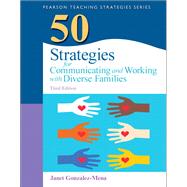
Note: Supplemental materials are not guaranteed with Rental or Used book purchases.
Purchase Benefits
What is included with this book?
Janet Gonzalez-Mena is Retired Faculty in Child and Family Studies, Napa Valley College, Napa California, where for 15 years she was on the full-time faculty until her retirement in 1998. Not only has she taught in the California community college system for 36 years, but also Gonzalez-Mena’s career includes being a preschool teacher in a bilingual program, child care director, and coordinator of a pilot program of therapeutic child care for abused and neglected children. A prolific author, her textbook achievements include: Child, Family, and Community, 6th ed. (Pearson, 2013); Infants, Toddlers and Caregivers, 9th ed. (McGraw-Hill, 2012); Foundations of Early Childhood Education: Teaching Children in a Diverse Society, 6th ed., (McGraw-Hill, forthcoming); and Diversity in Early Care and Education: Honoring Differences, 4th ed. (National Association for the Education of Young Children, 2008). Janet also co-authored Basics of Developmentally Appropriate Practice: An Introduction for Teachers of Infants and Toddlers (National Association for Education of Young Children, 2011). Currently self-employed as a consultant in early care and education, she also finds the time to write for Young Children and Exchange, and occasionally for publications in Canada and New Zealand.
Section 1: Welcoming Everybody
Chapter 1: Appreciating All Kinds of Families
Chapter 2: Working with Immigrant Families
Chapter 3: Including Families of Children with Special Needs
Chapter 4: Creating an Antibias Environment
Chapter 5: Respecting All Families, Including Those with Same-Sex Parents
Section 2: Partnerships with Families
Chapter 6: Building Partnerships
Chapter 7: Removing Barriers to Partnerships
Chapter 8: Minimizing Competition with Parents
Chapter 9: Supporting Attachments
Chapter 10: Considering Authority
Chapter 11: Focusing on Family Strengths
Chapter 12: Helping Parents to Be Advocates for Their Children
Chapter 13: Encouraging Parents to Become Advocates for All Children
Chapter 14: Creating a Sense of Community
Section 3: Honoring and Working with Diversity
Chapter 15: Understanding and Appreciating Cultural Differences
Chapter 16: Establishing Culturally Responsive Education and Care
Chapter 17: Working with Conflicts Around Education and Care Practices
Chapter 18: Considering Cultural Differences in Guidance and Discipline
Chapter 19: Working with Families Around What You Believe Are Harmful Practices
Chapter 20: Thinking about Differing Ideas Related to How Children Learn
Chapter 21: Managing Conflicts
Section 4: Family Participation and Education
Chapter 22: Considering Family Participation
Chapter 23: Including Families in the Classroom or Center
Chapter 24: Focusing on Fathers and Grandfathers
Chapter 25: Taking a Transformative Approach to Parent Education
Chapter 26: Working With Families Around Holiday Issues
Chapter 27: Exploring Parents' Role on Decision-Making Boards and Councils
Section 5: Communication
Chapter 28: Creating Environments for Communication
Chapter 29: Empowering Self and Others
Chapter 30: Communicating Through Writing
Chapter 31: Holding Ongoing Conversations with Families
Chapter 32: Looking at Nonverbal Communication Across Cultures
Section 6: Meetings and Conferences
Chapter 33: Meeting with Families for the First Time
Chapter 34: Thinking About Meetings in General
Chapter 35: Holding Conferences
Chapter 36: Considering Cross-Cultural Conferences
Chapter 37: Talking with Families when Concerns Arise
Section 7: Working with Parents around Specific Issues
Chapter 38: Helping teh Child Enter the School or Program
Chapter 39: Maintaining Home Languages
Chapter 40: Easing Children Through Transitions
Chapter 41: Brining Nature into Children's Lives
Chapter 42: Addressing Obesity with Nutrition
Chapter 43: Dealing with Media Issues
Chapter 44: Maintaining Stability During Divorce
Chapter 45: Coping with a Death in the Family
Chapter 46: Finding Community Resources and Making Referrals
Section 8: Challenging Conversations
Chapter 47: Working with Parents Who Constantly Complain
Chapter 48: Working with Family Members Who Appear Hostile
Chapter 49: Talking with Families About Behavior Changes
Chapter 50: Referring Families for Abuse or Neglect
The New copy of this book will include any supplemental materials advertised. Please check the title of the book to determine if it should include any access cards, study guides, lab manuals, CDs, etc.
The Used, Rental and eBook copies of this book are not guaranteed to include any supplemental materials. Typically, only the book itself is included. This is true even if the title states it includes any access cards, study guides, lab manuals, CDs, etc.